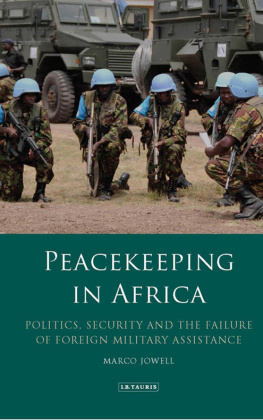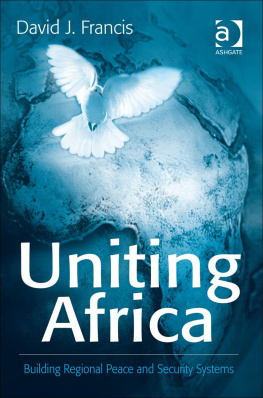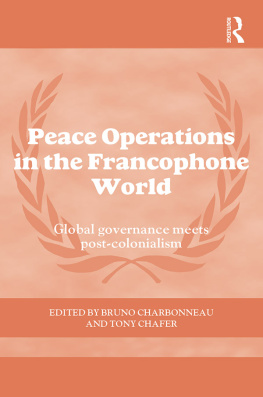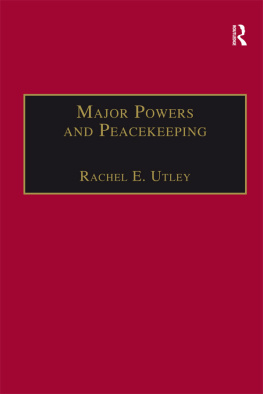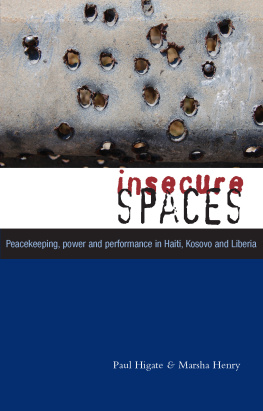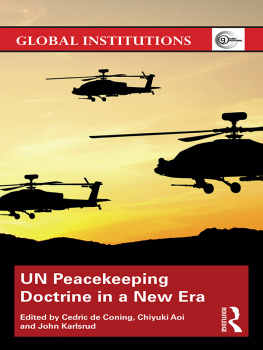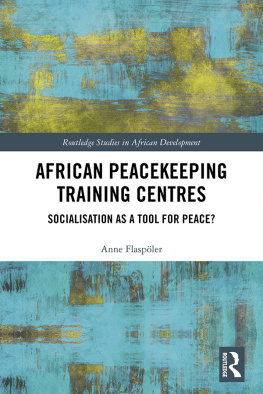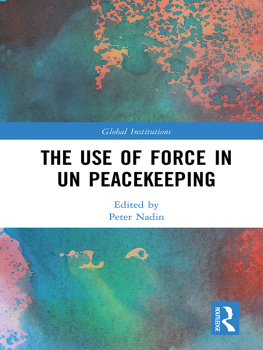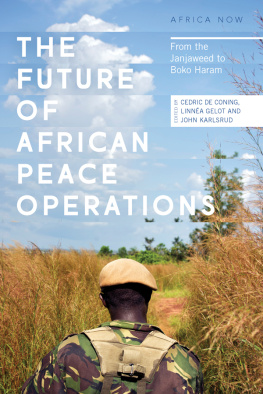Marco Jowell is a research associate at the Centre for African Studies at the School of Oriental and African Studies (SOAS) and Director of the Africa Research Group. He is a leading expert in the politics, political economy and security dynamics of East and Central Africa and holds a PhD in Politics and International Studies from SOAS, University of London.
This fascinating study provides major insight into the world of Africa's politico-military aristocracy, underlining how peacekeeping training centres have increasingly become the centrepiece of Western-African security engagement. Marco Jowell, a former technical and strategic adviser to a number of these institutions, is uniquely placed to explain not only what is meant to happen in peacekeeping training centres but also what actually does. In piecing together the curricula and cultures of centres across the continent, Peacekeeping in Africa demonstrates the flawed assumptions that undergird many of these organisations and the extent to which they, unintentionally, help to reify and consolidate fundamentally illiberal regional security cultures.
Jonathan Fisher, Senior Lecturer in African Politics,
University of Birmingham
Peacekeeping is a generic term covering a variety of modes of conflict resolution. This study of the Peace Support Operations training centres in Kenya, Ghana, Rwanda and Ethiopia, based on the author's extensive personal testimony, shows the dangers of exploitation by patrimonial, financial and national interest. It is well researched and makes a real contribution to our understanding of an important dimension of peacekeeping.
Professor J E Spence OBE FKC, Department of War Studies,
Kings College, London
Marco Jowell's book has broken new ground in the study of global peacekeeping. This is a timely and highly welcome contribution to scholarship.
Philip Cunliffe, Senior Lecturer in International Conflict,
University of Kent
What happens when international donors try and infuse liberal norms into politicised African militaries through regionally focused peacekeeping training regimes? Based on a decade of experience as part of this process, Marco Jowells innovative study uncovers the power dynamics at the heart of this peculiar form of foreign military assistance. Drawing on techniques of military sociology he examines the intended and unintended consequences of training African peacekeepers with case studies of missions in Darfur, the Democratic Republic of the Congo and Somalia, as well as several regionally focused training centres. His conclusion that these efforts have often been subverted to support partisan domestic agendas highlights the need for fundamental reforms in how training processes are organised and managed.
Paul D. Williams, Associate Professor of International Affairs
at the George Washington University, USA

Published in 2018 by
I.B.Tauris & Co. Ltd
London New York
www.ibtauris.com
Copyright 2018 Marco Jowell
The right of Marco Jowell to be identified as the author of this work has been asserted by the author in accordance with the Copyright, Designs and Patents Act 1988.
All rights reserved. Except for brief quotations in a review, this book, or any part thereof, may not be reproduced, stored in or introduced into a retrieval system, or transmitted, in any form or by any means, electronic, mechanical, photocopying, recording or otherwise, without the prior written permission of the publisher.
References to websites were correct at the time of writing.
International Library of African Studies 60
ISBN: 978 1 78453 989 4
eISBN: 978 1 78672 341 3
ePDF: 978 1 78673 341 2
A full CIP record for this book is available from the British Library
A full CIP record is available from the Library of Congress
Library of Congress Catalog Card Number: available
For Mum and Dad, Adam, Laura and Alexis
LIST OF FIGURES
A Typology of African Armed Forces.
MONUC Organisational Structure 2009/10.
ASF Deployment Scenarios.
EASBRIG/EASF Benchmarks and Objectives.
The Conflict Cycle.
Post-Conflict Reconstruction.
ACKNOWLEDGEMENTS
This research has taken a great deal of time and really begins in 2007 when I met Colonel Andy Mason in the sticks in Rwanda. I am indebted to Mace for taking me on while I was a wide-eyed young man in his early twenties and for planting the PSO/SSR seed in my head from day one, as well as being an inspiration to work with. This book has been a labour of love and I have been extremely fortunate in having a great deal of support but also willingness to discuss some of the issues on the part of my respondents. I am extremely grateful to a large number of people who have assisted me, talked to me and supported me over the last three years. In Kenya I must thank the International Peace Support Training Centre (IPSTC) and staff members there, in particular the Director Brigadier General Robert Kabage and his predecessor Major General Robert Kibochi. Although we may disagree on some aspects of the analysis, their willingness to engage with a controversial researcher and to accept me within their training centre is testament to their professionalism. I am indebted to the rest of the staff at IPSTC for a plethora of frank discussions, open access attitude and for accommodating me. Gratitude is also extended to the East African Standby Force and staff, and in particular Benediste Horeau, who had an open door policy to my many visits.
Thanks must go to Professor Makumi Mwagiru for the many evenings of whiskey and political debate at the mess bar in the National Defence College in Nairobi. In Rwanda I am eternally indebted to Brigadier General Frank Rusagara who has been an inspiration, provided invaluable assistance with my research there and has been a dear friend for many years. Thanks also to Colonel Jill Ruteremara and the rest of the team at the Rwanda Peace Academy who hosted me during my stay. In Ethiopia, a great deal of thanks to Colonel Yossi Yonatan who guided me around the EIPKTC. From the Kofi Annan Centre, Emma Bwirakong deserves a notable mention for answering all my probing questions. In Uganda Colonel Felix Kulaigye, Simon Mulongo and Colonel Stephen Kashure; all of whose professionalism, open-mindedness and friendship have assisted me greatly in my research.
In London, I owe a great deal of thanks to Professor Stephen Chan who has been my academic mentor for ten years. His guidance has been invaluable and inspiring, and without it I certainly would not have been able to undertake this, nor any other academic endeavour. A deep appreciation must be said of Nick Bates, Umar Anwer and Josh Kron who have been supportive and encouraging throughout. Others who warrant an acknowledgement include Colonel James Cunliffe, Wanyama Masinde, Lt Colonel David Holmes, Colonel Joyce Sitienei, General Karenzi Karake, Jonathan Fisher, Phil Clark, Pritish Behuria, Benjamin Chemouni, staff at the AU PSOD and many others who supported, assisted and worked with me over the last few years. All errors are of course my own.
Finally, a great deal of thanks must go to my family. To my mother and brother, my stepmother, in-laws and late father, who have all been so supportive throughout. An important thank you to both John Cobain and Danny Jowell who provided much needed and crucial reviewing. Most of all a colossal thank you to my wife Laura who provided no end of assistance, support and advice and who is a daily inspiration.

